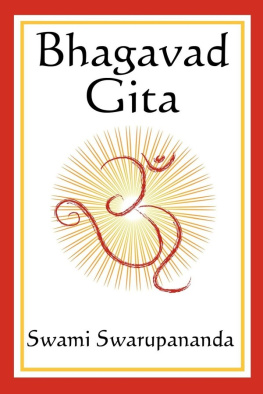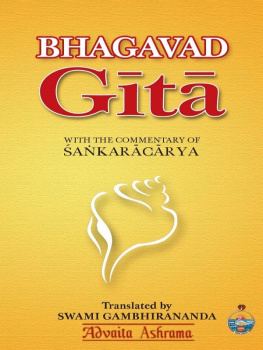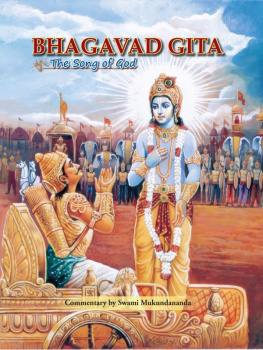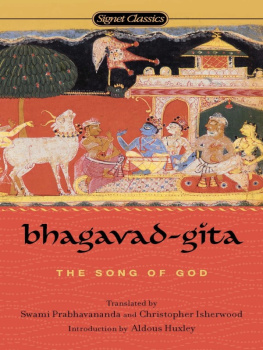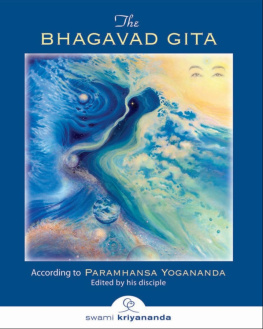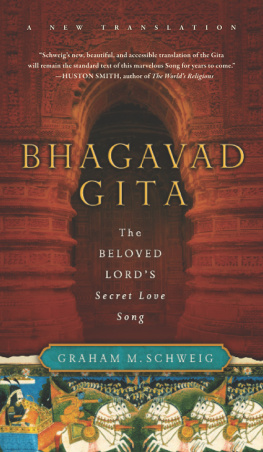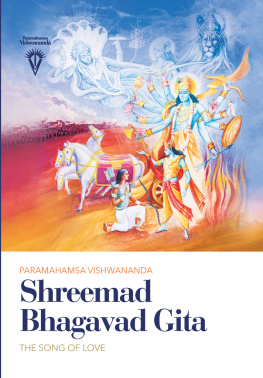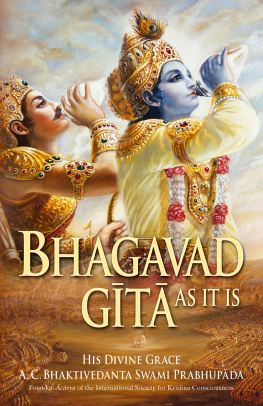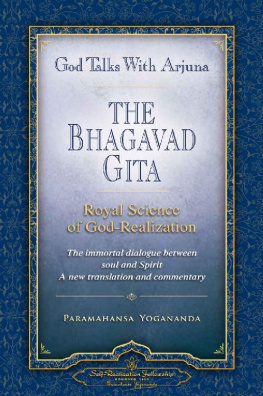Bhagavad Gita
Translated by Swami Swarupananda
Being a Discourse Between Arjuna, Prince of India, and the Supreme Being Under the Form of Krishna
Start Publishing LLC
Copyright 2012 by Start Publishing LLC
All rights reserved, including the right to reproduce this book or portions thereof in any form whatsoever.
First Start Publishing eBook edition October 2012
Start Publishing is a registered trademark of Start Publishing LLC
Manufactured in the United States of America
10 9 8 7 6 5 4 3 2 1
ISBN 978-1-62793-352-0
The Grief of Arjuna
Dhritarashtra said:
1) Tell me, O Sanjaya! Assembled on Kurukshetra, the center of religious activity, desirous to fight, what indeed did my people and the Pandavas do?
Sanjaya said:
2) But then King Duryodhana, having seen the Pandava forces in battle array, approached his teacher Drona and spoke these words:
3) Behold, O Teacher! this mighty army of the sons of Pandu, arrayed by the son of Drupada, your gifted pupil.
4-6) Here [are] heroes, mighty archers, the equals in battle of Bhima and Arjunathe great warriors Yuyudhana, Virata, Drupada; the valiant Dhrishtaketu, Chekitana, and the king of Kashi; the best of men, Purujit, Kuntibhoja, and Shaibya; the powerful Yudhamanyu, and the brave Uttamaujas, the son of Subhadra and the sons of Draupadiall of whom are lords of great chariots.
7) Hear also, O best of the twice-born! the names of those who [are] distinguished amongst ourselves, the leaders of my army. These I relate [to you] for your information.
8) Yourself and Bhishma and Karna and Kripa, the victorious in war. Ashvatthama and Vikarna and Jayadratha, the son of Somadatta.
9) And many other heroes also, well-skilled in fight, and armed with many kinds of weapons, are here, determined to lay down their lives for my sake.
10) This our army defended by Bhishma [is] impossible to be counted, but that army of theirs, defended by Bhima [is] easy to number.
11) [Now] do, being stationed in your proper places in the divisions of the army, support Bhishma alone.
12) That powerful, oldest of the Kurus, Bhishma the grandsire, in order to cheer Duryodhana, now sounded aloud a lion-roar and blew his conch.
13) Then following Bhishma, conchs and kettle-drums, tabors, trumpets, and cowhorns blared forth suddenly from the Kaurava side, and the noise was tremendous.
14) Then, also, Madhava and Pandava, stations in their magnificent Chariot yoked with white horses, blew their divine conchs with a furious noise.
15) Hrishikesha blew the Panchajanya, Dhananjaya, the Devadatta,and Vrikodara, the doer of terrific deeds, his large conch Paundra.
16) King Yudhishthira, son of Kunti, blew the conch named Anantavijaya, and Nakula and Sahadeva, their Sughosha and Manipushpaka.
17) The expert bowman, king of Kashi, and the great warrior Shikhandi, Dhristadyumna, and Virata, and the unconquered Satyaki;
18) O Lord of Earth! Drupada and the sons of Draupadi, and the mighty-armed son of Subhadra, all, also blew each his own conch.
19) And the terrific noise resounding throughout heaven and earth rent the hearts of Dhritarashtras party.
20) Then, O Lord of Earth, seeing Dhritarashtras party standing marshalled and the shooting about to begin, the Pandava, whose ensign was the monkey, raising his bow, said the following words to Krishna:
Arjuna said:
21-22) Place my chariot, O Achyuta! between the two armies that I may see those who stand here prepared for war. On this eve of battle [let me know] with whom I have to fight.
23) For I desire to observe those who are assembled here for fight, wishing to please the evil-minded Duryodhana by taking his side on this battle-field.
Sanjaya said:
24-25) O Bharata, commanded thus by Gudakesha, Hrishikesha drove that grandest of chariots to a place between the two hosts, facing Bhishma, Drona, and all the rulers of the earth, and then spoke thus, Behold, O Partha, all the Kurus gathered together!
26) Then saw Partha stationed there in both the armies, grandfathers, fathersin- law, and uncles, brothers and cousins, his own and their sons and grandsons, and comrades, teachers, and other friends as well.
27) Then, he, the son of Kunti, seeing all those kinsmen stationed in their ranks, spoke thus sorrowfully, filled with deep compassion.
Arjuna said:
28-29) Seeing, O Krishna, these my kinsmen gathered here eager for fight, my limbs fail me, and my mouth is parched up. I shiver all over, and my hair stands on end. The bow Gandiva slips from my hand, and my skin burns.
30) Neither, O Keshava, can I stand upright. My mind is in a whirl. And I see adverse omens.
31) Neither, O Krishna, do I see any good in killing these my own people in battle. I desire neither victory nor empire, nor yet pleasure.
32-34) Of what avail is dominion to us, of what avail are pleasures and even life, if these, O Govinda! for whose sake it is desired that empire, enjoyment, 3 and pleasure should be ours, themselves stand here in battle, having renounced life and wealthteachers, uncles, sons, and also grandfathers, maternal uncles, fathers-in-law, grandsons, brothers-in-law, besides other kinsmen.
35) Even tough these were to kill me, O slayer of Madhu, I could not wish to kill themnot even for the sake of dominion over the three worlds, how much less for the sake of the earth!
36) What pleasure indeed could be ours, O Janardana, from killing these sons of Dhritarashtra? Sin only could take hold of us by the slaying of these felons.
37) Therefore we ought not to kill our kindred, the sons of Dhritarashtra. For how could we, O Madhava, gain happiness by the slaying of our own kinsmen?
38-39) Though these, with understanding overpowered by greed, see no evil due to decay of families, and no sin in hostility to friends, why should we O Janaradana, who see clearly the evil due to the decay of families, not turn away from this sin?
40) On the decay of a family the immemorial religious rites of that family die out. On the destruction of spirituality, impiety further overwhelms the whole of the family.
41) On the prevalence of impiety, O Krishna, the women of the family become corrupt; and women being corrupted, there arises, O Varshneya, intermingling of castes.
42) Admixture of castes, indeed is for the hell of the family and the destroyers of the family; their ancestors fall, deprived of the offerings of rice-ball and water.
43) By these misdeeds of the destroyers of the family, bringing about confusion of castes, are the immemorial religious rites of the caste and the family destroyed.
44) We have heard, O Janardana, that dwelling in hell is inevitable for those men in whose families religious practices have been destroyed.
45) Alas, we are involved in a great sin, in that we are prepared to slay our kinsmen, out of greed for the pleasures of a kingdom!
46) Verily, if the sons of Dhritarashtra, weapons in hand, were to slay me, unresisting and unarmed, in the battle, that would be better for me.
Sanjaya said:
47) Speaking thus in the midst of the battle-field, Arjuna, casting away his bow and arrows, sank down on the seat of his chariot, with his mind distressed with sorrow.
The Way of Knowledge
Sanjaya said:
1) To him who was thus overwhelmed with pity and sorrowing, and whose eyes were dimmed with tears, Madhusudana spoke these words.
The Blessed Lord said:
2) In such a crisis, whence comes upon you, O Arjuna, this dejection, unArya-like, disgraceful, and contrary to the attainment of heaven?
3) Yield not to unmanliness, O son of Pritha! Ill does it become you. Cast off this mean faintheartedness and arise, O scorcher of your enemies!

